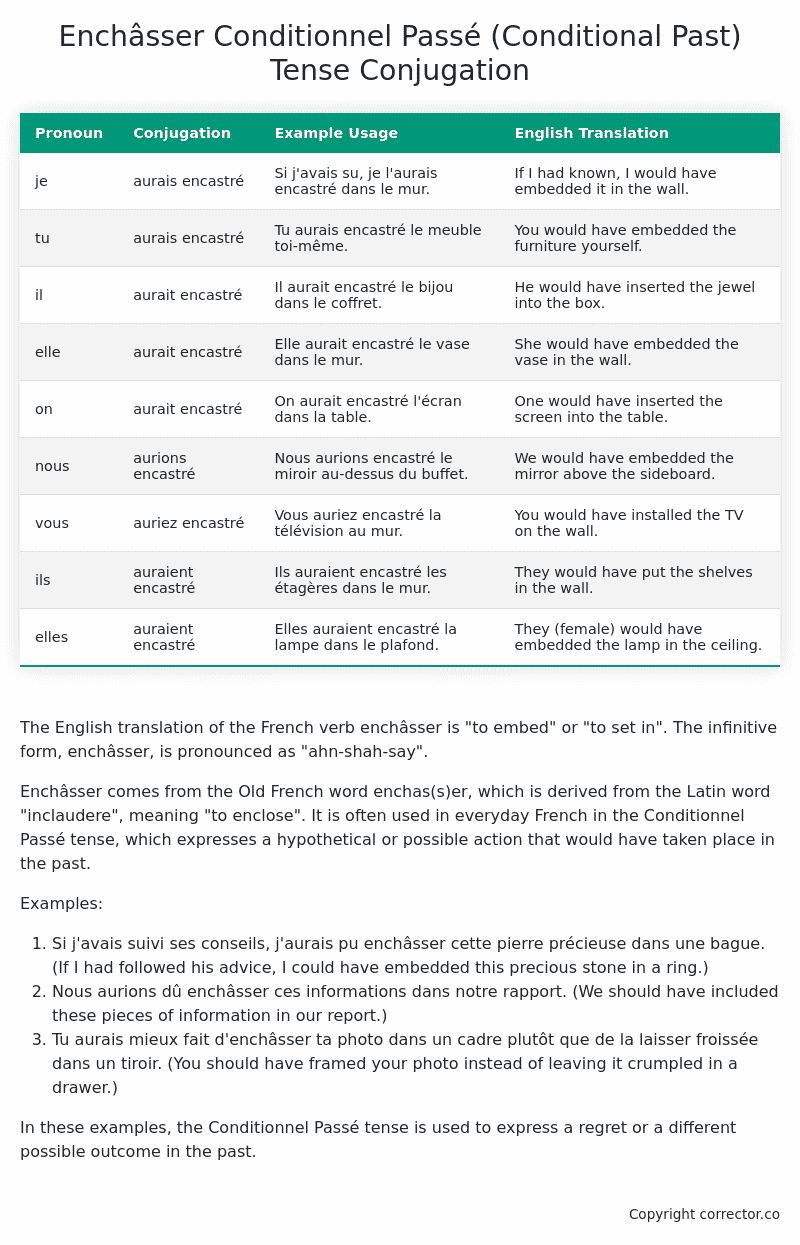Conditionnel Passé (Conditional Past) Tense Conjugation of the French Verb enchâsser
Introduction to the verb enchâsser
The English translation of the French verb enchâsser is “to embed” or “to set in”. The infinitive form, enchâsser, is pronounced as “ahn-shah-say”.
Enchâsser comes from the Old French word enchas(s)er, which is derived from the Latin word “inclaudere”, meaning “to enclose”. It is often used in everyday French in the Conditionnel Passé tense, which expresses a hypothetical or possible action that would have taken place in the past.
Examples:
- Si j’avais suivi ses conseils, j’aurais pu enchâsser cette pierre précieuse dans une bague. (If I had followed his advice, I could have embedded this precious stone in a ring.)
- Nous aurions dû enchâsser ces informations dans notre rapport. (We should have included these pieces of information in our report.)
- Tu aurais mieux fait d’enchâsser ta photo dans un cadre plutôt que de la laisser froissée dans un tiroir. (You should have framed your photo instead of leaving it crumpled in a drawer.)
In these examples, the Conditionnel Passé tense is used to express a regret or a different possible outcome in the past.
Table of the Conditionnel Passé (Conditional Past) Tense Conjugation of enchâsser
| Pronoun | Conjugation | Example Usage | English Translation |
|---|---|---|---|
| je | aurais encastré | Si j’avais su, je l’aurais encastré dans le mur. | If I had known, I would have embedded it in the wall. |
| tu | aurais encastré | Tu aurais encastré le meuble toi-même. | You would have embedded the furniture yourself. |
| il | aurait encastré | Il aurait encastré le bijou dans le coffret. | He would have inserted the jewel into the box. |
| elle | aurait encastré | Elle aurait encastré le vase dans le mur. | She would have embedded the vase in the wall. |
| on | aurait encastré | On aurait encastré l’écran dans la table. | One would have inserted the screen into the table. |
| nous | aurions encastré | Nous aurions encastré le miroir au-dessus du buffet. | We would have embedded the mirror above the sideboard. |
| vous | auriez encastré | Vous auriez encastré la télévision au mur. | You would have installed the TV on the wall. |
| ils | auraient encastré | Ils auraient encastré les étagères dans le mur. | They would have put the shelves in the wall. |
| elles | auraient encastré | Elles auraient encastré la lampe dans le plafond. | They (female) would have embedded the lamp in the ceiling. |
Other Conjugations for Enchâsser.
Le Present (Present Tense) Conjugation of the French Verb enchâsser
Imparfait (Imperfect) Tense Conjugation of the French Verb enchâsser
Passé Simple (Simple Past) Tense Conjugation of the French Verb enchâsser
Passé Composé (Present Perfect) Tense Conjugation of the French Verb enchâsser
Futur Simple (Simple Future) Tense Conjugation of the French Verb enchâsser
Futur Proche (Near Future) Tense Conjugation of the French Verb enchâsser
Plus-que-parfait (Pluperfect) Tense Conjugation of the French Verb enchâsser
Passé Antérieur (Past Anterior) Tense Conjugation of the French Verb enchâsser
Futur Antérieur (Future Anterior) Tense Conjugation of the French Verb enchâsser
Subjonctif Présent (Subjunctive Present) Tense Conjugation of the French Verb enchâsser
Subjonctif Passé (Subjunctive Past) Tense Conjugation of the French Verb enchâsser
Subjonctif Imparfait (Subjunctive Imperfect) Tense Conjugation of the French Verb enchâsser
Subjonctif Plus-que-parfait (Subjunctive Pluperfect) Tense Conjugation of the French Verb enchâsser
Conditionnel Présent (Conditional Present) Tense Conjugation of the French Verb enchâsser
Conditionnel Passé (Conditional Past) Tense Conjugation of the French Verb enchâsser (this article)
L’impératif Présent (Imperative Present) Tense Conjugation of the French Verb enchâsser
L’infinitif Présent (Infinitive Present) Tense Conjugation of the French Verb enchâsser
Struggling with French verbs or the language in general? Why not use our free French Grammar Checker – no registration required!
Get a FREE Download Study Sheet of this Conjugation 🔥
Simply right click the image below, click “save image” and get your free reference for the enchâsser Conditionnel Passé tense conjugation!

Enchâsser – About the French Conditionnel Passé (Conditional Past) Tense
Formation
Common Everyday Usage Patterns
Expressing Unreal Past Scenarios
Polite Requests or Suggestions
Expressing Doubt or Uncertainty
Interactions with Other Tenses
Conditional Present
Indicative Past Tenses
Conditional Future
Summary
Want More?
I hope you enjoyed this article on the verb enchâsser. Still in a learning mood? Check out another TOTALLY random French verb conjugation!


